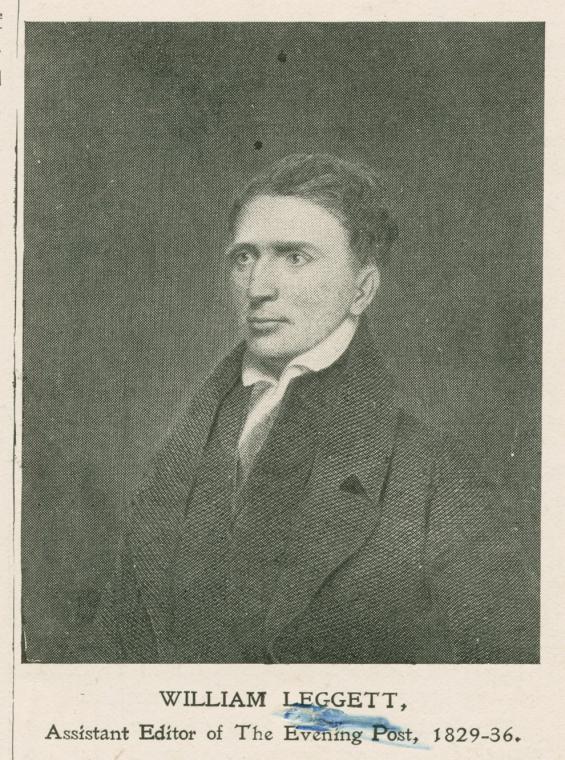Liberty Matters
The Disconnect between Ideas and Political Reality

I would like again to thank Phil and the other participants for a really fruitful and nuanced discussion about Leggett, free banking, slavery, and capitalism. Just a few quick rejoinders to the conversation. I share Phil's "philosophical frustrations when navigating the politics of the Jacksonian Era." My own journey started not in the northeast, but in the expanding cotton belt where southern planters continued to talk like economic liberals on the macro-level while acting (on the micro) like brutal oligarchs suppressing a free labor market. In public discourse they sang (selectively) the praises of Adam Smith's Wealth of Nations, trumpeted the free movement of individuals and property, and derided government, especially federal-level interventions in the economy. They conveniently ignored Smith's Theory Moral of Sentiments. Rather than accept that the growing antislavery impulse of the early 19th century's "impartial spectator" ought to inform their actions, they mounted an increasingly vigorous defense of slavery. They worked hard to convince the world that they were classical liberals, and it is ironic that current critics of liberalism have taken them at their word.
Worried about government interference in their domestic fiefdoms/corporate entities, they erected a proslavery ideology and the institutional power to preserve their coerced labor. That concern ultimately propelled them to secession, the erection of their own fairly centralized government, and war. That course ironically brought about the very government action they had feared, one actually enforceable because of the power of the second-largest army in the world at the time. (China's was a bit bigger.) Emancipation and reconstruction wiped out one major source of entrenched wealth, though unfortunately both the racist prejudice undergirding slavery and (in most instances) black economic subjugation remained, again often at the hands of local and state law, but sometimes out of well-intentioned federal policy. Political subordination of freed-men and -women also returned by century's end in ways that have been powerfully and tragically explained. In that context, it is not entirely surprising to me that Leggett's intellectual ideas found little currency.
Perhaps unsurprisingly, our posts continue to illustrate the disconnect between ideas and political realities. In the context of partisan politics, there was little ideological purity, a point that drew Leggett's ire and draws our own. Part of this challenge results from the demands that coalition parties put on government, especially during times of crisis, but I think it is more than that. As public-choice scholars remind us, individuals in a democracy expect politicians to do things for them. (Why else do corporations and other special interests dump millions into lobbying efforts, campaign coffers, and direct advertising?) The new institutional and policy histories of the 19th century might open up additional windows into how economic actors directly engaged the government.
Here historians have a great deal to learn from the outstanding work of economists like Professor White (who it has been a pleasure to share this platform with), Douglass Irwin, and others. Phil's work on the tariff of 1861 presents one such example, highlighting that even as the union was in crisis, special interests lined up in hopes of gaining government privileges.[67] Daniel Peart's recent book on tariff lobbyists helps to fill a major void by offering a more systematic study of how those debates played out in the antebellum press and the corridors of power. Peart's book shows that there were real tangible economic and political issues at stake and also that interest usually trumped principle. It has the added benefit of highlighting that votes often hinged on one or two swing congressmen. I found his demonstration of contingency oddly comforting in a time when political extremes again appear to be ripping apart our public discourse with vitriol that might further threaten individual liberty. Leggett doesn't make an appearance in Peart's book, but he might have.[68]
A truer understanding of 19th-century capitalism would shed light on how different economic actors engaged local, state, and federal politics to bring about their desired policy ends. That has proven difficult, though, because until recently most scholars with a post-New Deal perspective believed that the 19th-century state was practically nonexistent. Leggett offers a different starting point. He drew from a deeply American suspicion of the effects of privileged, which is to say, government-sanctioned, power. His editorials sought to mobilize voters to end those privileges and to expand choice, leaving arguments that may not align with our own political discourse any more clearly than they did with the discourse of his day.
Endnotes
[67.] Phillip W. Magness, "Morrill and the Missing Industries: Strategic Lobbying Behavior and the Tariff, 1858–1861," Journal of the Early Republic 29, no. 2 (2009): 287–329.
[68.] Daniel Peart, Lobbyists and the Making of US Tariff Policy, 1816-1861 (Baltimore: The Johns Hopkins University Press, 2018).
Copyright and Fair Use Statement
“Liberty Matters” is the copyright of Liberty Fund, Inc. This material is put on line to further the educational goals of Liberty Fund, Inc. These essays and responses may be quoted and otherwise used under “fair use” provisions for educational and academic purposes. To reprint these essays in course booklets requires the prior permission of Liberty Fund, Inc. Please contact oll@libertyfund.org if you have any questions.